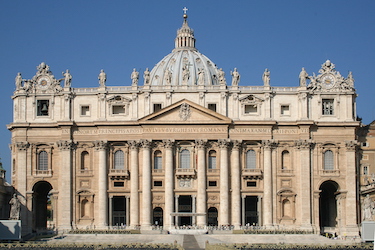
Roman Catholicism. The Roman Catholic Church is the largest Christian church, with 1.28 to 1.39 billion baptized Catholics worldwide as of 2024. Known often as just “Catholic,” although many Anglicans, Russian and Greek Orthodox also consider themselves “Catholic.”
The Roman Catholic Church is among the world’s oldest and largest international institutions, and has played a prominent role in the history and development of Western civilization. The church consists of almost 3,500 dioceses around the world. The pope, who is the bishop of Rome, is the chief pastor of the church.
The Diocese of Rome, known as the Holy See, is the central governing authority of the church. The administrative body of the Holy See, the Roman Curia, has its principal offices in Vatican City, a small independent city-state and enclave within the Italian capital city of Rome, of which the pope is head of state.
The core beliefs of Roman Catholicism are found in the Nicene Creed. The Roman Catholic Church teaches that it is the ‘one, holy, catholic and apostolic church’ founded by Jesus Christ in his Great Commission, that its bishops are the successors of Christ’s apostles, and that the pope is the successor to Saint Peter, upon whom primacy was conferred by Jesus Christ.
The church maintains that it practices the original Christian faith taught by the apostles, preserving the faith infallibly through scripture and sacred tradition as authentically interpreted through the magisterium of the church.
Catholic social teaching emphasizes voluntary support for the sick, the poor, and the afflicted through the corporal and spiritual works of mercy. The Catholic Church operates tens of thousands of Catholic schools, universities and colleges, hospitals, and orphanages around the world, and is the largest non-government provider of education and health care in the world. Among its other social services are numerous charitable and humanitarian organizations.
The Roman Catholic Church has profoundly influenced Western philosophy, culture, art, literature, music, law, and science. Roman Catholics live all over the world through missions, immigration, diaspora, and conversions. Since the 20th century, the majority have resided in the Southern Hemisphere, partially due to secularization in Europe. The Catholic Church shared communion with the Eastern Orthodox Church until the East–West Schism in 1054, disputing particularly the authority of the pope.
In the 1530’s Henry VIII split with Rome for a variety of reasons including his desire to be Supreme Head of the Church of England, with all the power and revenues that would bring; a desire to rid his realm of superstition and open the Word of God to the people. Thus, the Vatican suffered another split and the Anglican Communion was born, to be known as the Episcopal Church in the U.S.
In the 16th century, the Reformation led to the formation of separate, Protestant groups challenging the authority of Rome.
From the late 20th century, the Catholic Church has been criticized for its teachings on sexuality, its doctrine against ordaining women, and its handling of sexual abuse cases involving clergy.